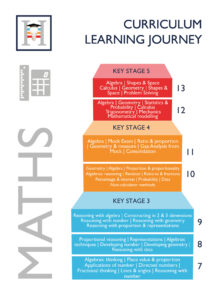Mathematics is a creative and highly inter-connected discipline that has been developed over centuries, providing the solution to some of history’s most intriguing problems. It is essential to everyday life, critical to science, technology and engineering, and necessary for financial literacy and most forms of employment. A high-quality mathematics education therefore provides a foundation for understanding the world, the ability to reason mathematically, an appreciation of the beauty and power of mathematics, and a sense of enjoyment and curiosity about the subject.
Aims
The national curriculum for mathematics aims to ensure that all pupils:
- Become fluent in the fundamentals of mathematics, including through varied and frequent practice with increasingly complex problems over time, so that pupils develop conceptual understanding and the ability to recall and apply knowledge rapidly and accurately. reason mathematically by following a line of enquiry, conjecturing relationships and generalisations, and developing an argument, justification or proof using mathematical language
- Can solve problems by applying their mathematics to a variety of routine and non- routine problems with increasing sophistication, including breaking down problems into a series of simpler steps and persevering in seeking solutions.
- Mathematics is an interconnected subject in which pupils need to be able to move fluently between representations of mathematical ideas. The programme of study for key stage 3 is organised into apparently distinct domains, but pupils should build on key stage 2 and connections across mathematical ideas to develop fluency, mathematical reasoning and competence in solving increasingly sophisticated problems. They should also apply their mathematical knowledge in science, geography, computing and other subjects.
Maths students are categorised by two groups at Harlington throughout Key Stage 3 and 4 – ‘working towards’ and ‘working above’. Decisions about progression are based on the security of pupils’ understanding and their readiness to progress to the next stage. Pupils who grasp concepts rapidly are challenged through being offered rich and sophisticated problems in our ‘working above’ group and those who are not sufficiently fluent consolidate their understanding, in our ‘working towards’ group, before moving on.


